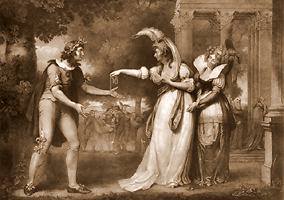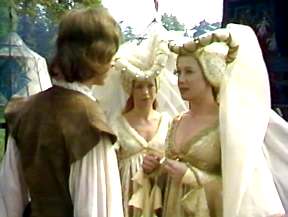
This play was and is relatively popular, perhaps oddly so since the plot is so slim and it's difficult to get an angle on this one beyond the near ubiquitous critical adoration of Rosalind: e.g., "Rosalind is a sort of universal image of Woman as Sweetheart" (Goddard, I 293). The Lord Chamberlain's Men prevented publication of As You Like It in 1600 in order to preserve their sole rights to it. Since it does not show up in Meres' bibliography in 1598, a date of 1599 is traditionally assigned it, absurdly. Oxfordians find historical parallels to political events in the early 1580s, and underneath the awkward additions it does seem like an early comedy. And many Stratfordians, even of the caliber of George Lyman Kittredge and A.L. Rowse, have thought that the play as we have it is a revision of an earlier version.
|
Thomas Lodge's Rosalynde (1590) is a pastoral prose romance which
Stratfordians insist served as the source for the play, while Oxfordians
think it used the earlier version of the play as its source. Many
of the romance genre's features are shared in this play: minimal plotting,
slim motivations, forest setting, abject lovers. You get cross-dressing,
wrestling, songs and dance, all amid an exploration, and a somewhat
philosophical one (dramatized), of love. Shakespeare's most significant
additions are the characters Touchstone and Jaques, "both essentially
commentators, little involved in the action" (Wells 173). For good concise
commentary on the differences between the the play and the
Lodge version, see
this.
|

|
Against the criticism that "nothing happens that changes the course of [the characters'] lives" (Jenkins, qtd. in French 115), Marilyn French replies, "But the play focuses not on the course but on the texture of the characters' lives, of their relation to earth, not the world. Hierarchical structures like plot, possessions like kingdoms and estates, are irrelevant to this dimension of human experience" (115). Whereas one can see Love's Labour's Lost as a play about "the relation of love and learning, As You Like It has to do with the relation of love and wisdom" (Goddard, I 282). Additionally, "The play's title is not, perhaps, the throw-away phrase it may seem: during the course we see that the quality of human experience is influenced by the attitude that people bring to it" (Wells 174).
ACT I
SCENE i
The youngest son of Sir Rowland de Boys, the slighted Orlando, kvetches about his ill treatment at the hands of his oldest brother Oliver. The name "de Boys" is an "Englishing" of the French "du Bois": "of the woods" (Farber 440), and perhaps echoing "Valois," the French royal family in the later 1500s (Ogburn and Ogburn 445). Also, the French Rowland = the Italian Orlando (Farber 440). Another brother, "Jaques he keeps at school, and report speaks goldenly of his profit. For my part, he keeps me rustically at home" (I.i.5-7). Oliver's horses have it better than Orlando, he complains, since his own treatment "differs not from the stalling of an ox" (I.i.10). "This is it ... that grieves me, and the spirit of my father, which I think is within me, begins to mutiny against this servitude" (I.i.21-24). Adam the servant patiently listens, and his name resonates, especially since this scene is set in an orchard and involves the archetypal sibling rivalry à la Cain and Abel. (An embarrassingly slim tradition holds that Shakespeare himself played what is guessed to be the role of Adam on the stage.) The old man announces with respectful equilibrium, "Yonder comes my master, your brother" (I.i.26). Orlando is sure Oliver inevitably "will shake" him up (I.i.28).
Orlando offers cheeky chop-logic punning and a defiant tone amid references to "naught" (I.i.35) and "prodigal" (I.i.38). Soon, violence breaks out between the brothers, despite Adam's appeal for peace. Orlando demands that Oliver give him either a gentleman's education or his portion of the inheritance. Oliver commands Adam to go with Orlando, calling him "you old dog" (I.i.81). Adam replies, "Is 'old dog' my reward? Most true, I have lost my teeth in your service. God be with my old master, he would not have spoke such a word" (I.i.82-84).
Oliver takes a meeting with Charles, a wrestler, from whom he hears of the Duke Senior's banishment to the forest of Arden by his usurping brother Duke Frederick and of the friendship of their respective daughters Rosalind and Celia. Duke Senior lives "like the old Robin Hood of England. They say many young gentlemen flock to him every day, and fleet the time carelessly, as they did in the golden world" (I.i.116-119). Charles proves to be an honorable professional: he has heard that Orlando intends to show up tomorrow in disguise (presumably, Orlando's social rank would disqualify him from such a wrestling competition), and the concerned wrestler doesn't want to end up hurting him. Oliver pretends he already knew and has tried "by underhand means" to dissuade Orlando from this (I.i.140), and he paints his brother as villainous: "I had as lief thou didst break his neck as his finger" (I.i.146-147). [If Orlando represents Alençon, it's significant that it was said of Queen Elizabeth, "a wound on his little finger would pierce her heart" (qtd. in Ogburn and Ogburn 448-449), and that there was notable animosity directed at Alençon by his older brother Henry III (Ogburn and Ogburn 446).] Oliver convinces wrestler Charles that Orlando intends to kill him -- so don't hold back in tomorrow's bout. When Charles leaves, Oliver privately acknowledges his irrational animosity towards Orlando and Shakespeare, not atypically, minimizes villainous motivation:
I hope I shall see an end of him; for my soul (yet I know not why) hates nothing more than he. Yet he's gentle, never school'd and yet learned, full of noble device, of all sorts enchantingly belov'd, and indeed so much in the heart of the world, and especially of my own people, who best know him, that I am altogether mispris'd. But it shall not be so long.... (I.i.164-171)
SCENE ii
Cousins Rosalind and Celia talk lightly of various subjects. [If Rosalind represents Queen Elizabeth, the Tudor "Rose," (Ogburn and Ogburn 447) -- rosa linda = beautiful rose in Spanish -- then it's interesting that in the 1560s Elizabeth had a close companion at court: Lady Cecilia of Sweden (Ogburn and Ogburn 448).] Although Rosalind is depressed about her father's banishment, Celia promises to make amends when her own father dies. Rosalind changes the topic: "Let me see -- what think you of falling in love?" (I.ii.25). Celia agrees, provided it remains a light, arbitrary, whimsical pastime. They speak of Fortune and women, Celia noting that "those that she makes fair she scarce make honest" (I.ii.37-38). Rosalind distinguishes Fortune from Nature, and Touchstone, the clown, picks up the conversation, bantering with them for a while about honor, wit, and the function of fools. Celia claims, "always the dullness of the fool is the whetstone of wits" (I.ii.54-55), and, "since the little wit that fools have was silenc'd, the little foolery that wise men have makes a great show" (I.ii.88-90). This certainly seems to be "a cutting reference to some contemporary event" (Asimov 564), perhaps Oxford's banishment in 1581 (Clark 517) or perhaps something worse later.
The dippy courtier Monsieur Le Beau arrives, "With his mouth full of news" (I.ii.92). Le Beau doesn't realize that Touchstone and the others are mocking his inflated courtly affectations through their artificially heightened language as he reports on the first part of the wrestling match and broken ribs. The women observe Orlando and try to dissuade him from proceeding with the match. Orlando politely rejects their proposal, confessing that he is willing to die and would be unmourned. Rosalind, à la Elizabeth being equivocal to Alençon regarding the funds for his campaigns, says, "The little strength that I have, I would it were with you" (I.ii.194-195). Charles the wrestler calls forth his challenger: "where is the young gallant that is so desirous to lie with his mother earth?" (I.ii.200-201). The wrestling takes place, with Celia remarking, "I would I were invisible, to catch the strong fellow by the leg" (I.ii.211-212) -- an allusion to a low-class Athena, the spear-shaker (?). She adds, "If I had a thunderbolt in mine eye, I can tell who should down" (I.ii.214-215) -- a reference to Zeus. Another reference to "Hercules" (and later Orlando's "little beard") may tip us off to the connection to Alençon, whose name was Hercule-François de Valois (Ogburn and Ogburn 451-452).

|
When Orlando wins the match, the presiding Duke Frederick's enthusiasm
is dimmed by the revelation that Orlando's father, the honorable Sir
Rowland de Boys, was his enemy. Rosalind mentions that her father esteemed
Sir Rowland. [And perhaps we have a reflection of Leicester's opposition
to the Alençon match with Elizabeth (Ogburn and Ogburn 454).]
The two women congratulate Orlando and Rosalind gives him a chain: "Wear
this for me: one out of suits with Fortune, / That could give more, but
that her hand lacks means" (I.ii.246-247). As they part, Orlando murmers
an explanation for his awkwardness, calling himself "a mere lifeless block"
(I.ii.251). Rosalind perceives, or willfully perceives, this to be his
calling them back for more conversation. "Sir, you have wrastled well,
and overthrown / More than your enemies" (I.ii.254-255). Orlando is struck
speechless by Rosalind. It becomes clear that Orlando was "overthrown"
not by Charles but by meeting Rosalind, and vice versa.
Le Beau warns Orlando that he ought to leave, due to Duke Frederick's wrath. Orlando gets from Le Beau information as to the identities of the women. Le Beau reports that Frederick resents the people's love and pity for Rosalind and that likely his malice "Will suddenly break forth" against her (I.ii.283). |
SCENE iii
Celia now tries to cheer up Rosalind because of the latter's love-melancholy: "Come, come, wrestle with thy affections" (I.iii.21). Celia's father, Duke Frederick, enters and immediately banishes Rosalind due to her potentially traitorous allegiance to her father: "Thou art thy father's daughter, there's enough" (I.iii.58-59). This despite Rosalind's insistence on her innocence and despite Celia's protestations. Frederick thinks Celia is being used: "She is too subtle for thee.... she robs thee of thy name" (I.iii.76-80). He is ready to kill his niece.
Celia will not abandon Rosalind, so, at Celia's suggestion, the women decide to venture into the forest of Arden to seek Rosalind's father, Rosalind herself disguised as a man: "A boar-spear in my hand ... / We'll have a swashing and a martial outside, / as many other mannish cowards have" (I.iii.118-121). She will call herself Ganymede, and Celia with adopt the pseudonym Aliena. Rosalind's enthusiasm for the scheme seems to exceed the need for it. She recommends that they bring along Touchstone, "the clownish fool," as "a comfort to our travel" (I.iii.130-131). Celia rejoices, "Now go we in content / To liberty, and not to banishment" (I.iii.137-138).